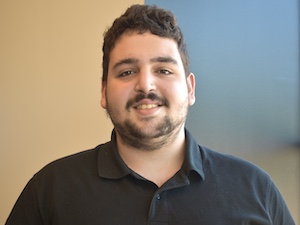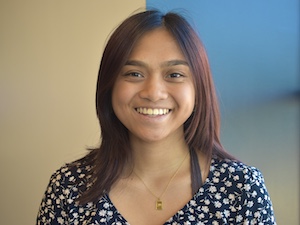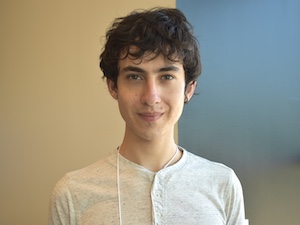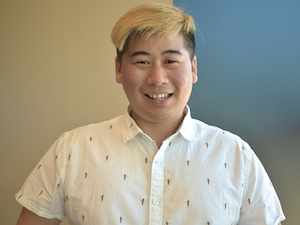2022 Week 5: Government/Policy
 Kerim Bali | Office of Councilmember Mark Conway
Kerim Bali | Office of Councilmember Mark Conway
I would like to think that I have learned a lot in my first five weeks of internship – that’s not to brag in any way, but just to demonstrate what a great source of information and experience working in local government can be.
During my internship, I developed a strong passion for local politics. Even as a Political Science major and a self-proclaimed political geek, I have to admit that I never really knew how the mechanisms of local government worked and didn’t closely follow local politics or elections. I knew on an intellectual level that local politics mattered (that’s what the textbooks taught us!) but I never realized how much. I also have to admit that I went in thinking that most people who call would be angry or unreasonable; that’s the stereotype you have of people complaining to their local representatives. However, that is not the case at all. Instead, most people who call are tired because the government has failed them so many times over the years.
One sad lesson I have learned has been that sometimes things just really aren’t possible. There have been some minor reasonable requests that have come into the office that we simply cannot solve, for reasons ranging from government red tape to not enough money in the budget. However, even in those moments, I have come to understand that listening is so important. A lot of people I have met or talked to have been living in the same neighborhood of Baltimore since before my parents were alive, and they have spent decades without getting any attention from any government representative – apart from election years, of course. That’s why I must admit, at the risk of sounding biased, that I have come to admire the Councilman I work for. Whenever we visit a constituent, they are shocked that he even bothered to come to their neighborhoods and talk to them. It’s a sad reality, but I am definitely glad that he’s trying to fix it.
 Mikayla Chua | Office of Councilmember James Torrence
Mikayla Chua | Office of Councilmember James Torrence
This week, I reflected on how hard and soft skills work in tandem when on the job.
I was able to hone my active listening skills, as we discussed its importance as an ambassador of Hopkins, and to be conscious of my position in the community. Active listening skills have allowed me to be more attentive and considerate to other people, even to the tiniest consideration. While I constantly worry that I may seem passive or not ask enough questions, I realize that your presence and effort do not necessarily have to shine through by being the loudest in the room but by being a diligent, effective coworker.
While I considered myself to have strong “written communication skills”, I realized that this looks different in relation to that place of work. This is something that is adapted to the team, especially if it is a close, collaborative environment that relies heavily on communication with each other. For instance, a lot of 311 service entails emails back and forth to the constituent, other members in the office, and other agencies. While I naturally tend to write wordy emails staying polite and filling the email to the brim with information, I realize that rather than being helpful, I was being more of a hindrance to the team. The office gets inundated with emails as it stands already. To best help the flow and streamline of communication, more efficient, concise, succinct emails will suffice.
This consideration was further solidified when one of my supervisors noted the importance of effective writing, even though the comment was not directed at me. I also took note of the volume of emails and calls that the office receives, the mention of it around the office, and the constant battle to keep up with constituent service because of that. From then on, I had to mentally pause when writing my emails and actively remind myself to communicate in a way that maintains professionalism while getting straight to the point. This is what keeps the process moving best, even if it feels against my nature to do so. My active listening skills helped me realize how to better adapt to office dynamics, while also strengthening my written communication skills. I will keep this thought with me as I go onto other jobs in order to best get through the learning curve that comes with onboarding onto any new job.
 Sigrid Edson | Mayor’s Office of Immigrant Affairs
Sigrid Edson | Mayor’s Office of Immigrant Affairs
I don’t have a solid plan for after graduation or a concrete idea of what professions I may hold or want to hold in the future, but I think one major lesson I have learned at my internship so far will serve me well regardless of my path, and may even help me find it: If there’s something you believe should exist that doesn’t exist, go ahead and make it. This is how and why MIMA was originally founded, it’s the reason behind the Asian American Advisory Committee being formed by the office right now, and it’s the driver of countless community-led initiatives and organizations. In the case of MIMA and the advisory board, there was some kind of bureaucratic legitimation needed to start and develop a project — something that can be an obstacle, but also a source of funding and vital institutional support. However, in other cases, you don’t need permission to make something happen, and often starting a project can lead to relationships and developing bases of power rather than the other way around.
I see this as a valuable perspective going into my life after graduation because it reminds me that I don’t necessarily need external (or institutional) legitimacy — in the form of a graduate degree, a fellowship, a formal program, or a paid position — to work on projects I care about, whether they are research-based, social justice-oriented, or creative. Yes, institutional support is an asset and financial sustainability a huge consideration, but those things shouldn’t preclude me from taking on things I care about.
 Carlos Gamboa | Office of Councilmember Zeke Cohen
Carlos Gamboa | Office of Councilmember Zeke Cohen
The week before last, at the community association meeting, I watched a group of squeegee boys on the street below, joking around, chatting, and occasionally washing a windshield or two. A week later, a heated interaction with squeegee workers left a local man dead.
The incident took place in broad daylight in the Inner Harbor. For still unknown reasons, the driver, a middle-aged White man, pulled over after passing the three workers, then approached them with a metal baseball bat. After a brief exchange, the driver began walking back to his car: the boys followed him, so he charged at them with the bat. One of them threw a rock at him, but he was undeterred; as he charged the boy, another worker drew a gun and shot him five times. The workers quickly scattered, and the man was pronounced dead shortly thereafter.
It took the police several days to find the shooter, who was hiding in a home in Baltimore County. The boy was denied bail: he faces eight charges, including first-degree murder, and is being tried as an adult. He is fifteen years old.
Discussions of how the city should proceed have led to charged debates in the past week. Progressive leaders argue that most of the squeegee workers are non-violent: they are simply teenagers trying to provide for their families. As such, the city has decided not to “clear the corners.” This approach would result in teenagers across the city, most of them Black, being removed from public spaces by the police. As Mayor Scott astutely noted, this perpetuates the criminalization of Blackness in America: panhandling is not illegal, and as such there is little basis for police action except in rare cases of violence. This strategy also fails to address the root cause of the situation, lack of employment opportunities and financial insecurity. Instead, the Mayor convened the “Squeegee Collaborative,” composed of local stakeholders such as business owners, nonprofit leaders, youth, and elected officials, to craft an equitable and effective strategy for handling the issue. This initiative builds upon the legacy of the Mayor’s 90-Day Squeegee Action Plan, which found jobs for forty former squeegee workers earlier this year.
On the other hand, my work inbox has been flooded with impassioned criticism of the Mayor’s plan, exposing me to the opposite side of the debate: outraged citizens pushing the city to enforce public order. From their perspective, the squeegee workers are a threatening presence. Most of the messages referred to the workers as “men,” not boys, and argued that they are often aggressive and a nuisance for Baltimore residents. Conservative politicians have also pointed out that while panhandling is not a crime, aggressive panhandling may fall outside the protection of the First Amendment. Another common feature of the complaints was the belief that the squeegee workers have other viable employment options and are choosing to ignore them, whether out of laziness or resistance to change. After years of frustration and, in some cases, harassment by squeegee workers, many citizens are unwilling to accept any solution but strict enforcement by the police.
This tragic encounter has taken the dilemma posed by the BB gun brothers and thrust it into the national spotlight: where should American society draw the line between maintaining public order and supporting disadvantaged groups? As is the case with every complex issue, both sides of the argument have valid points: while society has an obligation to invest in and support these teenagers, we also have a responsibility to protect all citizens and enforce the law. If the Squeegee Collaborative proves effective at reducing squeegee work, it will be an empowering victory for progressive leaders. However, if the problem persists, the city may yet turn to the police for a solution, threatening further violence. As the Mayor’s plan goes into effect, the citizens of Baltimore expect tangible results: if not, more unrest is sure to follow.
 Diksha Iyer | Out for Justice
Diksha Iyer | Out for Justice
My time at Out For Justice has already been extremely fruitful, as I have learned much about the criminal justice system and how systemic racism can be seen in various facets of our society, including environmentally, economically, and medically. I have started to learn how to be an ally, how to constructively engage with a vulnerable community, and how to advocate for myself. I have learned how to check others and also check myself. I have learned how the formerly incarcerated community has been discriminated against, and how we can create pathways to advocate for them. While entering my placement, I thought that my interest in healthcare policy might not translate to the mission of the organization. However, I now understand how a future profession as a lawyer involved in healthcare policy can directly impact vulnerable, formerly incarcerated populations. How medical system is not necessarily structured for BIPOC patients, and medical professionals do not always inform their treatments based on the context of their surroundings. Policies that encourage humane, educated treatment of BIPOC patients and make accessible healthcare a right, can empower the population that we work with at Out For Justice. Alongside the knowledge I now have of the interconnected nature of systemic racism, I learned how this discriminatory system is enforced by the legislative system, and how we can use the system to protest that injustice. Though I knew the basic structure of the legislative process/system in America, I was sorely uneducated on how local government can be powerful. I am now more prepared to be an educated and active citizen, which will always be one of my life goals. Without understanding how the legislative process works, I would have lacked critical thinking skills need to make informed choices about my preferred candidates.
While these are important skills that will help me succeed in college and beyond, I have learned, most importantly, to have good intentions. My supervisor, Nicole, who is the head of Out For Justice, taught me that she will always help a member of her community while she has the resources to do so, even if it takes them a while to understand or appreciate her efforts. She told me that some people come to her with the intention of taking advantage of her, but she cannot control their motives. She can only control how she responds to them, and she chooses to do it with empathy. She chooses to teach them how to vote, to provide them to legal assistance, or even money for a bus pass. She does her work with a profound commitment to service, one that I hope to embody in my future profession. She is an immensely dedicated person who has taught me to emphasize the collective nature of change. In every email she sends, she signs off with the quote, “Only you alone can do it, but you can’t do it alone.” This quote embodies what I have learned: a willingness to be given feedback and grow, and a dedication to the entire community without undue, harmful discrimination.
 Frank Meng | BCPS Engagement Department
Frank Meng | BCPS Engagement Department
Last week I talked about how my colleague’s attention to detail taught me that accessibility is more than fancy language in the training sessions; rather, it is about shifting perspectives and putting yourself in others’ shoes. This is not only a lesson on accessibility but also enhanced my understanding of literature. As an English major, I spend the majority of my free time reading and writing. When I was reorganizing my bookshelf, I stumbled on one of my favorite books, “To Kill a Mockingbird.” I thoroughly read the book many times and always recall the quote about empathy— “You never really understand a person until you consider things from his point of view. Until you climb inside of his skin and walk around in it.” Atticus teaches Scout his life lesson, telling him to live with empathy and understanding toward others. I always take pride in how I advocate for marginalized communities, especially for queers. Every community, however, has different struggles and stories. You cannot use the same approach in all communities. These fictions have real-life applications, and you have to experience life to better understand literature. Literature should not and cannot be separated from life. Because I have the privilege of having ample access to the internet and grew up in the digital age, I need to listen to those who are not familiar with fancy technologies—not taking anything for granted but being attentive and accommodating.
We had some last-minute emergency meetings last week because one of my colleagues had to take some time off to take care of family. I quickly adopted the new agenda and learned how to adjust to the new schedule. With tremendous support from my supervisor, we deliver the presentation on time with quality. This is more than being professional but how to support and lift up each other when facing difficulties.
